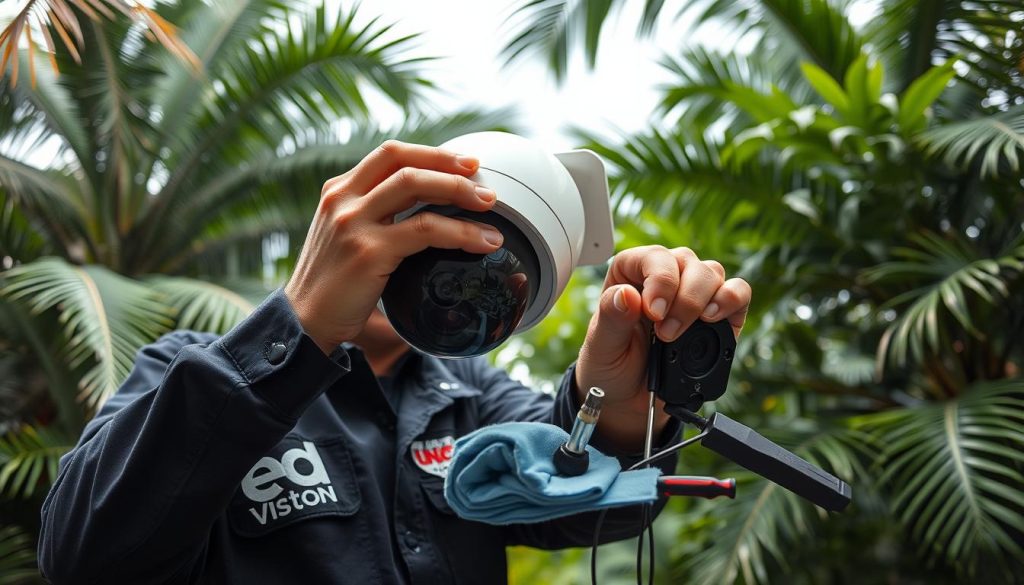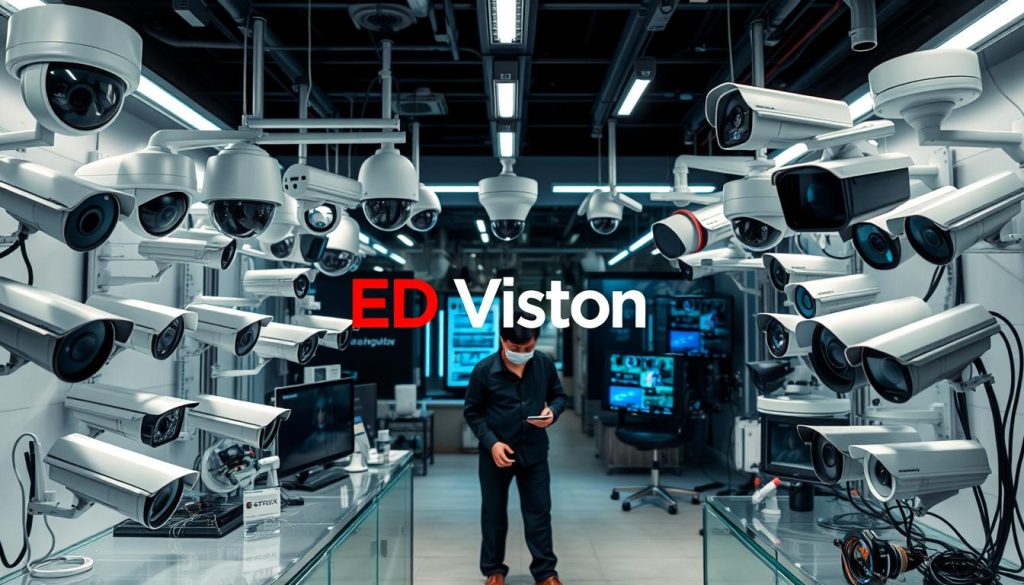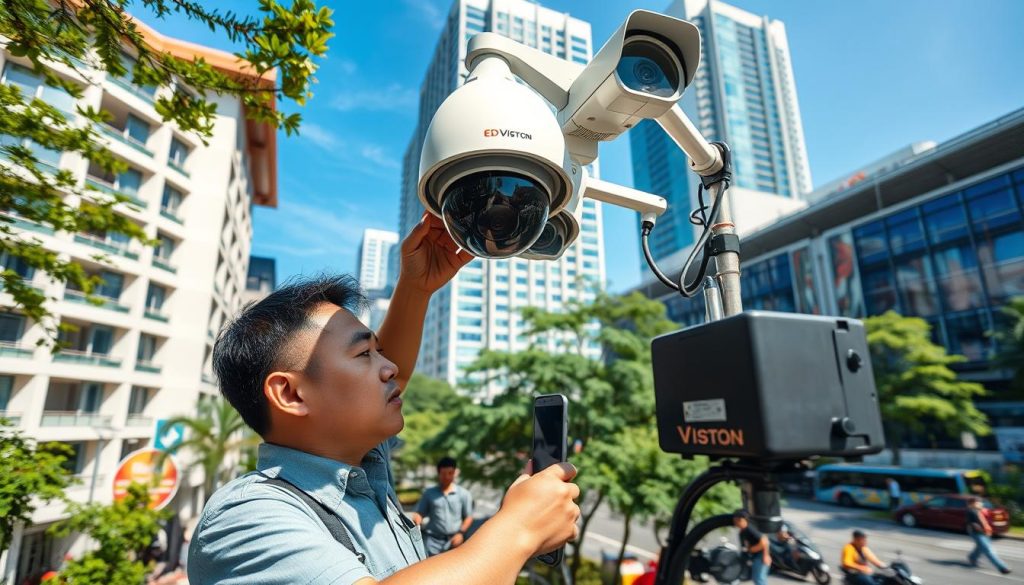Keeping security cameras in top shape is key for safety in Singapore’s climate. High humidity and changing temperatures can affect how well they work. This guide will cover important steps for keeping your cameras running smoothly. It focuses on CCTV maintenance and surveillance camera upkeep.
Regular care is not just a good idea; it’s a must. It helps avoid equipment failures, meets local laws, and keeps your system working well. Studies reveal that about 70% of CCTV problems come from not maintaining them. This highlights the need to fix these issues quickly.
For specific advice and expert help, contact ED Viston at +65 8313 4578.
Key Takeaways
- Regular maintenance every six months is essential for optimal CCTV performance.
- 85% of CCTV systems benefit from uninterrupted power supply systems.
- 60% of users face image distortion due to inadequate camera housing conditions.
- 70% of maintenance issues are due to cabling problems; regular checks are necessary.
- Over 90% of security professionals believe regular maintenance enhances reliability.
- Annual system checks from vendors are vital to assess recorded data.
The Importance of Regular CCTV Maintenance
Regular CCTV maintenance is key to keeping surveillance systems working well. It helps spot problems early, making both homes and businesses safer.
Boosting Security and Detecting Issues
By keeping up with CCTV maintenance, owners can find and fix security risks. About 70% of CCTV failures are due to easy fixes like bad wiring. Regular checks can stop these problems, keeping systems reliable.
Fixing issues like dirty lenses or cameras that aren’t right helps keep everything clear. This makes sure you can see what’s happening.
Cost Efficiency and Longevity
Regular maintenance is a smart money move. It can save businesses 15-30% on repair costs over time. Small fixes are much cheaper than big repairs, which can cost over SGD 10,000.
Well-kept systems last 20-30% longer than ones that aren’t. This makes regular maintenance a smart choice for saving money in the long run.
| Maintenance Activity | Frequency | Impact on Lifespan | Cost Comparison |
|---|---|---|---|
| Camera Lens Cleaning | Every 3 months | Increases clarity and functionality | Low (SGD 300 annually) |
| Power Supply Checks | Monthly | Prevents system failures | Moderate (SGD 500-1,000 annually) |
| Comprehensive System Inspections | Quarterly | Extends longevity by detecting issues early | High (SGD 5,000 or more for reactive repairs) |
Putting regular CCTV maintenance first is good for security and saves money. It helps your surveillance system last longer.
Understanding the Types of Maintenance for CCTV Systems
Keeping CCTV systems in top shape requires knowing the different maintenance types. Preventive maintenance helps systems work well, cutting down on unexpected breakdowns. Corrective maintenance fixes problems as they happen. Routine checks keep an eye on system health.
Preventive Maintenance Strategies
Preventive maintenance is essential for keeping equipment running long. Regular care can cut down equipment failures by up to 30%. This includes:
- Cleaning camera lenses every three months to ensure clear image capture.
- Regularly testing camera functionality and image quality.
- Maintaining waterproof casings to combat the humid conditions in Singapore.
- Checking storage capacity to ensure ample space for video recordings.
Corrective Maintenance Techniques
Corrective maintenance is key when problems pop up suddenly. This maintenance involves:
- Repairing malfunctioning cameras quickly to prevent security issues.
- Fixing power supply problems, which cause 72% of downtime.
- Dealing with wiring and connection issues, a big part of maintenance costs.
Routine Inspections and Their Importance
Routine checks are vital for spotting issues before they get worse. They help keep the system running smoothly. Experts suggest:
- Weekly checks for camera angles and system logs to ensure optimal functioning.
- Monthly inspections for cleaning lenses and checking cables for damage.
- Quarterly reviews to monitor system performance, effectiveness, and corrosion.
- Annual professional assessments for a detailed system check.
| Maintenance Type | Frequency | Purpose |
|---|---|---|
| Preventive Maintenance | Regular (monthly/quarterly) | To reduce equipment failures and enhance performance |
| Corrective Maintenance | As needed | To address immediate issues and restore functionality |
| Routine Inspections | Weekly/Monthly/Quarterly | To catch problems early and ensure compliance |
Benefits of Regular CCTV Maintenance
Regular CCTV maintenance offers many advantages. It boosts the performance and reliability of security systems. It ensures enhanced security, effective cost management, and longer equipment life.
Enhanced Security Benefits
Maintenance is key to keeping premises secure. A well-maintained CCTV system reduces risks by updating software. This prevents hacking.
Regular cleaning and calibration of cameras improve image quality by up to 40%. This means clearer footage and better incident detection. Without maintenance, up to 90% of CCTV failures happen, showing the need for regular service.
Cost Management Advantages
A maintenance plan helps manage costs. Minor issues are caught and fixed early, avoiding expensive repairs. Regular checks can cut emergency repair costs by 25%.
Having a CCTV maintenance contract means fewer unexpected call-outs. This lowers support costs and keeps systems running smoothly. This proactive approach helps manage costs well.
Increasing Equipment Longevity
Regular maintenance can extend CCTV equipment life by up to 50%. It delays the need for expensive replacements. Routine inspections help identify and fix problems early.
Professional maintenance services, recommended yearly, keep systems in top shape. This focus on longevity maximizes the value of your initial investment.
CCTV Maintenance Best Practices
Keeping your CCTV system in top shape is key. Regular maintenance boosts its performance and life span. It’s all about making sure your surveillance system works well.
Regular Cleaning of Camera Lenses
It’s important to clean your camera lenses often. Aim to do this every three months. This stops dust and dirt from messing with your view and video quality.
Outdoor cameras face more challenges. They get dirty faster because of the weather. So, they need more cleaning.
Inspecting and Testing Connections
Checking your CCTV system regularly is a must. Look at the wiring, connectors, and power supplies. This keeps everything running smoothly.
In places like Singapore, the weather can cause problems. Moisture can damage your system. Fixing issues quickly stops big problems and keeps your system working.
| Maintenance Task | Recommended Frequency | Notes |
|---|---|---|
| Clean Camera Lenses | Every 3 months | Essential for clear image quality. |
| Inspect Cable Connections | Regularly as conditions require | Prevent possible system failures. |
| Test Power Supplies | After storms or events | Ensure constant power. |
| Check Recording Functionality | Weekly to bi-weekly | Make sure it captures footage. |
Creating a CCTV Maintenance Schedule
Creating a CCTV maintenance schedule is key for your system’s reliability and efficiency. It outlines tasks and timelines to keep all parts working well. This way, you avoid unexpected failures and boost security.
A good plan helps manage daily, monthly, and quarterly tasks. It ensures your system runs smoothly.
Daily Checks for Immediate Issues
Daily checks are vital to spot any quick problems. These tasks include:
- Checking if each camera is working.
- Confirming camera angles are clear of obstructions.
- Testing recording equipment.
- Looking for any issues with power connections.
Monthly Maintenance Tasks
Monthly tasks are important for CCTV system care. Focus on:
- Cleaning camera lenses for better performance.
- Checking cables for damage and ensuring they’re secure.
- Examining power supplies to prevent problems.
- Testing playback to ensure system functionality.
Quarterly Comprehensive Reviews
Quarterly reviews offer a deep look at your system. They include:
- Inspecting camera housings and mounts.
- Confirming timestamp accuracy for legal reasons.
- Testing motion detection and PTZ functions.
- Keeping DVR or NVR clean to avoid issues.
Security Camera Maintenance Tips for Singapore’s Climate
Singapore’s humid climate makes security camera maintenance a big challenge. Keeping your cameras in good shape is key to fighting humidity and protecting them from the weather. By following some simple tips, you can make your surveillance system last longer and work better.
Managing Humidity Effects on Cameras
High humidity can cause mold and corrosion, hurting your camera’s performance. Here are some ways to fight these problems:
- Choose security cameras with IPX5 or IPX6 ratings for reliable outdoor water protection.
- Use weatherproof camera housings to keep moisture away from sensitive parts.
- Regularly clean camera lenses to keep video quality high.
- Mount cameras under eaves or awnings to avoid rain.
- Put cameras in full enclosures if it gets very cold.
Protecting Equipment from Local Elements
Things like heavy rain, dust, and strong winds can mess with your camera’s work. Here’s how to keep your system safe:
- Use outdoor-rated cables and add silicone caps for moisture protection.
- Choose the right spot for your cameras to avoid wind and rain.
- Go for screw-in mounts over adhesive ones in stormy areas.
- Keep cable lengths and connections right to avoid signal loss in bad weather.
- Store DVRs or NVRs in cool, clean places to avoid overheating and dust.
By following these steps, you can handle humidity and protect your equipment. This ensures your security camera system works well in Singapore’s varied climate.

Common Issues Faced During CCTV Maintenance
Regular maintenance is key for CCTV systems to work well. Owners face many common issues that can lower performance and quality. Knowing these problems helps fix them quickly, improving security.
Camera Lens Problems
Dirty or misaligned camera lenses can ruin surveillance. Dirt, dust, or moisture can blur images. Fixing these issues fast is vital for clear video.
Wiring and Connection Issues
Wiring problems are common in CCTV systems. Worn-out cables can cause signal loss. Extreme weather can make these issues worse. Regular checks help catch and fix these problems early.
Storage Capacity Challenges
Not enough storage can mess up video recording. In Singapore, CCTV systems often use cloud storage. Running out of space can delete important footage. Keeping enough storage ensures all footage is saved.
Security Camera Troubleshooting Techniques
Effective security camera troubleshooting is key to keeping your systems running smoothly. By using systematic methods, you can fix many problems. Here are some ways to improve your troubleshooting skills.
Inspecting Camera Lenses
Cleaning and checking lenses is important for clear images. Dust, dirt, or smudges can lower video quality. Regular lens cleaning can improve image quality by about 20%.
This simple step can often fix video issues before they get worse.
Checking Power Supplies
Power issues cause about 30% of CCTV problems. Modern IP cameras need 15W per port from PoE switches. It’s important to have enough power.
Look at LED indicators to see if cameras are working. If they’re not, check the power supplies first. Using a UPS can cut downtime by about 70% during power outages.
Examining Network Connections
Network problems often come from bad connectors. Make sure connections are secure at both ends. Also, check IP addresses to avoid conflicts.
Use commands like ARP (arp -a) to find active devices. If you have network issues, check login details or solve network segmentation problems.
Choosing Between Different Types of CCTV Systems
It’s important to know the different CCTV systems available. This helps pick the right one for your security needs. Wired and wireless systems have their own benefits and drawbacks.
Wired systems use cables for a stable connection. They often have better video quality. But, setting them up can be hard and needs careful planning.
Wireless systems use Wi-Fi for easy camera placement. They’re good for homes. But, they might face signal problems and cyber threats.
IP-based vs. Analog Systems
IP-based systems have cool features like high-quality video and remote access. They also need less cable, thanks to Power over Ethernet (PoE) cameras. This makes installation simpler.
But, these systems need strong cybersecurity because they use the internet. Analog systems are cheaper but have lower quality and need more upkeep.

Using a CCTV Maintenance Checklist
A CCTV maintenance checklist is key for strong surveillance and efficiency. It outlines important parts, helping you keep everything running smoothly. This way, you avoid problems before they start.
Key Components to Include
- Functionality Checks: Make sure all cameras work well. Check video quality, lens cleanliness, and network connections.
- Wiring and Connection Assessments: Look for damaged or corroded wiring. It can cause system failures.
- Storage Integrity Verification: Keep storage free by deleting old footage. This lets you keep recording without issues.
- Battery Replacement Monitoring: Watch battery levels in wireless cameras. Low batteries can stop recording suddenly.
- Software and Firmware Updates: Keep software up to date. It adds new features and fixes bugs, just like on phones.
How to Track Maintenance Activities
Keeping track of maintenance is vital for CCTV systems to work at their best. A detailed checklist helps spot trends and fix problems early. For example, logging when you check recordings and clean cameras helps avoid confusion.
This method makes tracking easier and ensures you follow the best CCTV management practices. It’s all about staying on top of your system’s health.
Security Camera Maintenance: Professional vs. DIY
Deciding between professional CCTV maintenance and DIY tasks is key. Knowing when to ask for help and when to do it yourself can greatly affect your security system’s performance. Experts can do deep checks and fix problems better than most people. But, you can save money and fix simple issues yourself.
When to Call in Professionals
It’s time to call professionals for certain problems. Issues like complex wiring or advanced tech failures need their skills. They ensure your system works well and lasts longer. Here are some situations where you should call experts:
- Recurring problems after trying DIY fixes
- Need for precise camera placement
- Following government or industry rules
- Adding features like 24/7 monitoring
DIY Maintenance Tips
DIY maintenance can help a lot with CCTV systems. Simple tasks can make your system work better. Here are some DIY tips:
- Clean camera lenses for better images
- Check connections and power regularly
- Watch for system performance issues
- Adjust settings for best performance
DIY maintenance can save money by avoiding professional fees. But, it’s important to know its limits. Lack of experience can lead to poor performance or mistakes. A mix of professional help for tough issues and DIY for everyday tasks is best. This way, your system works well and keeps you safe.
Importance of Security Camera Maintenance in Singapore
Security camera maintenance in Singapore is very important. The weather in Singapore can affect CCTV systems. Regular checks are key to keeping them working well.
About 70% of CCTV system failures are due to poor maintenance. This shows how critical maintenance is. It keeps your systems running and meets local security laws.
Well-maintained cameras can last 5 to 7 years. Neglected ones might only last 2 to 3 years. Regular checks can cut down equipment failures by up to 87%.
Homeowners and businesses should have a maintenance plan. This protects their properties. CCTV cameras are used by 93% of retailers in Singapore.
Monthly checks, like cleaning lenses and inspecting connections, improve image quality. They also reduce system downtime. Prioritizing maintenance boosts your systems’ performance and ensures long-term security.
FAQ
How often should I perform security camera maintenance?
What are the common issues that can arise with CCTV systems?
How can humidity affect my surveillance cameras?
What steps should I take for effective security camera troubleshooting?
Is it better to hire professionals for CCTV maintenance or do it myself?
What benefits does regular CCTV maintenance provide?
What should be included in a CCTV maintenance checklist?
How do wired CCTV systems differ from wireless systems?
What preventive maintenance strategies should I adopt for CCTV systems?
How do I create an effective CCTV maintenance schedule?
Source Links
- https://www.cctv-camera.com.sg/articles/cctv-maintenance-checklist.html
- https://cctvmaintenance.com.sg/optimal-cctv-service-frequency-for-security/
- https://www.spottersecurity.com/blog/regular-maintenance-cctv-systems/
- https://www.nmcabling.co.uk/2023/03/the-importance-of-regular-cctv-maintenance-and-repairs/
- https://wenhong.com.sg/what-are-the-types-of-maintenance-of-cctv/
- https://cctvmaintenance.com.sg/types-of-maintenance-of-cctv-in-singapore-explained/
- https://www.edviston.com/what-are-the-types-of-maintenance-of-cctv/
- https://wenhong.com.sg/how-often-should-cctv-be-serviced/
- https://clearview-communications.com/insights/how-businesses-benefit-from-cctv-maintenance/
- https://vocal.media/01/how-regular-cctv-maintenance-prevents-security-failures
- https://info.verkada.com/surveillance-features/security-camera-maintenance/
- https://brillianttechnology.com.au/practical-tips-for-maintaining-your-cctv-security-system/?srsltid=AfmBOor7zYrAMn0W0t1JN8wWc0kosP2R2cM9kEKQa3vUJL61zGt9IjgC
- https://www.bluechipgulf.ae/complete-guide-cctv-maintenance-services/
- https://brillianttechnology.com.au/practical-tips-for-maintaining-your-cctv-security-system/?srsltid=AfmBOopxLTAu1uuDvxKSQC3YuLUGffx5HHQhJ5TlpYWAGtUlgH5H6lKA
- https://www.faultfixers.com/blog/comprehensive-cctv-system-preventive-maintenance-checklist
- https://www.firstsolution.com.sg/blog/how-to-conduct-cctv-camera-maintenance/
- https://www.cnet.com/home/security/expert-tips-to-prepare-security-tech-for-the-cold-snow-or-rain/
- https://www.lorddecor.com/blog/understanding-the-lifespan-of-security-cameras-maintenance-tips-and-guidelines
- https://www.cctvcameraworld.com/security-camera-systems/tips-for-camera-system/
- https://cctvmaintenance.com.sg/common-cctv-camera-issues-in-singapore-explained/
- https://web.securitysystem.com.sg/cctv-problems-and-fix/
- https://trassir.com/articles/essential-guide-to-troubleshooting-ip-camera-systems/
- https://reconeyez.com/us/security-camera-maintenance/
- https://mammothsecurity.com/blog/security-maintenance-tips
- https://www.pelco.com/blog/types-of-cctv-cameras
- https://www.smartsecures.com/blog/choose-the-right-cctv-system
- https://www.intelligent-ai.com.my/choosing-the-right-cctv-camera-a-comprehensive-guide/
- https://www.fieldex.com/checklist/cctv-cameras-maintenance-checklist
- https://brillianttechnology.com.au/practical-tips-for-maintaining-your-cctv-security-system/?srsltid=AfmBOorRMcN6TxFut2iSUTlwiLvXgXl2tfu5hc3g3VOPhXZujcLI9QPi
- https://www.cnet.com/home/security/diy-home-security-vs-professionally-installed-systems-costs-compared/
- https://www.eximm.com/blog/the-pros-and-cons-of-diy-security-cameras-vs-professional-home-security-camera-installation/
- https://wenhong.com.sg/security-camera-maintenance-guide-for-singapore/
- https://www.edviston.com/do-cctv-cameras-need-maintenance/
- https://wenhong.com.sg/do-cctv-cameras-need-maintenance/

